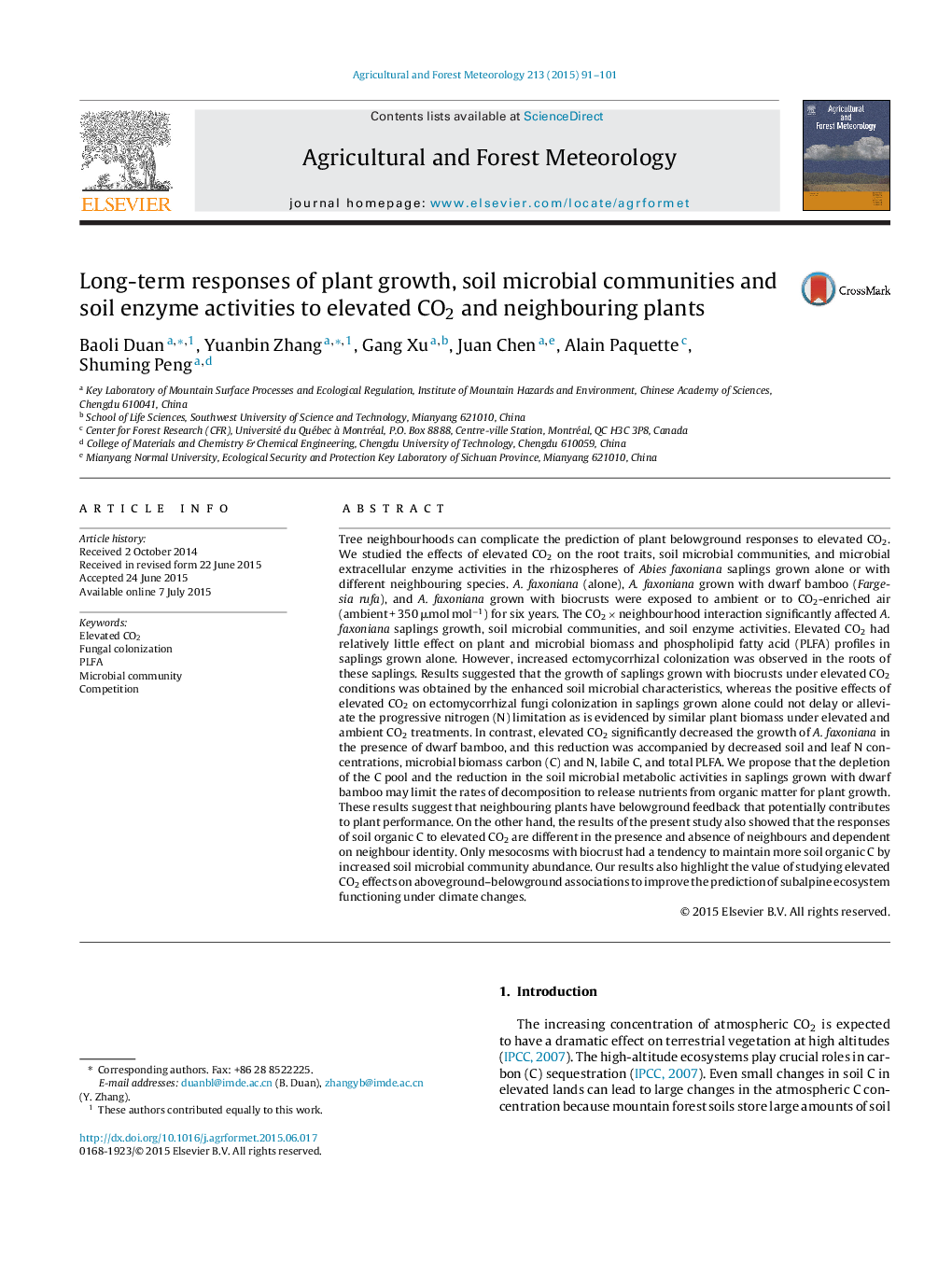| کد مقاله | کد نشریه | سال انتشار | مقاله انگلیسی | نسخه تمام متن |
|---|---|---|---|---|
| 81508 | 158320 | 2015 | 11 صفحه PDF | دانلود رایگان |

• Combined effects of CO2 and neighbours on Abies faxoniana were studied.
• Plants with different neighbours differed in their responses to elevated CO2.
• Elevated CO2 had little effect on microbial biomass in plants grown alone.
• Elevated CO2 reduced the total PLFAs in plants grown with dwarf bamboo.
• Biocrusts facilitate A. faxoniana by improving the soil microbial characteristics.
Tree neighbourhoods can complicate the prediction of plant belowground responses to elevated CO2. We studied the effects of elevated CO2 on the root traits, soil microbial communities, and microbial extracellular enzyme activities in the rhizospheres of Abies faxoniana saplings grown alone or with different neighbouring species. A. faxoniana (alone), A. faxoniana grown with dwarf bamboo (Fargesia rufa), and A. faxoniana grown with biocrusts were exposed to ambient or to CO2-enriched air (ambient + 350 μmol mol−1) for six years. The CO2 × neighbourhood interaction significantly affected A. faxoniana saplings growth, soil microbial communities, and soil enzyme activities. Elevated CO2 had relatively little effect on plant and microbial biomass and phospholipid fatty acid (PLFA) profiles in saplings grown alone. However, increased ectomycorrhizal colonization was observed in the roots of these saplings. Results suggested that the growth of saplings grown with biocrusts under elevated CO2 conditions was obtained by the enhanced soil microbial characteristics, whereas the positive effects of elevated CO2 on ectomycorrhizal fungi colonization in saplings grown alone could not delay or alleviate the progressive nitrogen (N) limitation as is evidenced by similar plant biomass under elevated and ambient CO2 treatments. In contrast, elevated CO2 significantly decreased the growth of A. faxoniana in the presence of dwarf bamboo, and this reduction was accompanied by decreased soil and leaf N concentrations, microbial biomass carbon (C) and N, labile C, and total PLFA. We propose that the depletion of the C pool and the reduction in the soil microbial metabolic activities in saplings grown with dwarf bamboo may limit the rates of decomposition to release nutrients from organic matter for plant growth. These results suggest that neighbouring plants have belowground feedback that potentially contributes to plant performance. On the other hand, the results of the present study also showed that the responses of soil organic C to elevated CO2 are different in the presence and absence of neighbours and dependent on neighbour identity. Only mesocosms with biocrust had a tendency to maintain more soil organic C by increased soil microbial community abundance. Our results also highlight the value of studying elevated CO2 effects on aboveground–belowground associations to improve the prediction of subalpine ecosystem functioning under climate changes.
Figure optionsDownload as PowerPoint slide
Journal: Agricultural and Forest Meteorology - Volume 213, November 2015, Pages 91–101